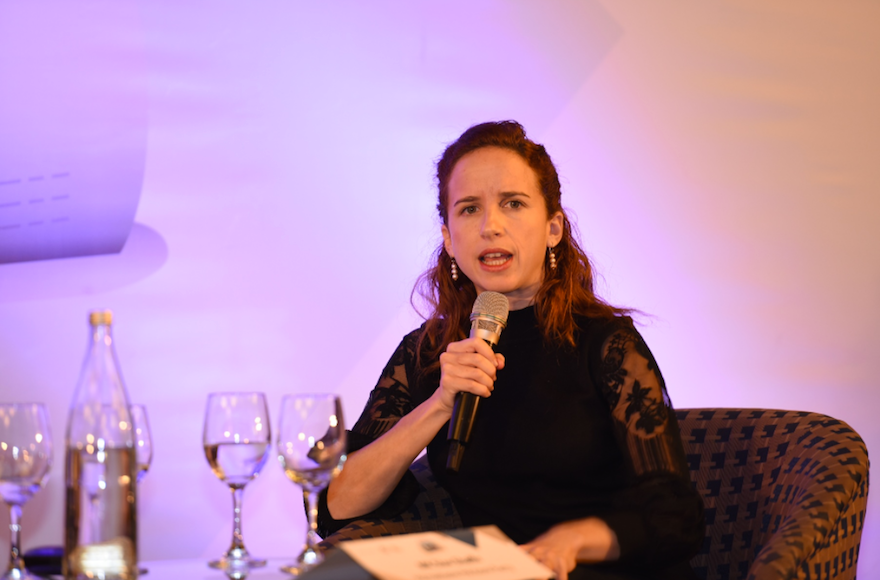I was in Israel for 36 hours before I saw daylight. Which can only mean one of three things:
1. The weather was lousy.
2. I am speaking metaphorically.
3. I am at a conference in the sub-basement of a Jerusalem hotel.
Here’s a hint: The weather is fine, and while apparently there’s plenty of sunshine, there’s not much clarity when it comes to the big issues afflicting this small place.
The Jerusalem Jewish Media Summit is a four-day affair run by Israel’s ministries for Foreign Affairs and Diaspora Affairs and the Government Press Office. Despite a name that should give the “alt-right” conniption fits, the “Jewish media” in this sense refers not to the global conspiracy but to folks like me working for Jewish newspapers, websites, news services and radio stations. Among the 50 people attending are editors and reporters from Canada, Romania, Germany, Uruguay, Turkey, Belgium and France.
Although the Diaspora is represented in all its far-flung glory, the concerns of the American media and their Jewish readers dominated the early days of the conference. There was a panel discussion on the stalled agreement promising a new egalitarian prayer space at the Western Wall, another on the impact of the Trump election, and a third on whether the Chicago Cubs World Series victory represented a harbinger of the coming of the Messiah. I am lying about the third thing, although I did have a serious discussion with a colleague about whether the Cubs championship represented such a tear in the time-space continuum that we slipped into an alternative universe in which a TV reality show host became president and picked a neurosurgeon as HUD secretary.
The summit is designed to build, or maybe repair, a connection between the Diaspora and Israel, a connection that many here feel has frayed in recent years. More than one speaker pointed out the gap between the largely liberal American Jewish polity, which gave 70 percent of its vote to the Democratic candidate in the recent election, and the Israeli electorate, which seems content with a right-wing government that is expected to remain in power until Prime Minister Benjamin Netanyahu’s baby grandson starts collecting Social Security.

Yair Lapid of Israel’s Yesh Atid party speaking at the Jewish Media Summit in Jerusalem, Dec. 5, 2016 (Israeli Government Press Office)
The Western Wall agreement is both symbol and cause of this breach: As Rabbi Naama Kelman, dean of the Reform movement’s Hebrew Union College here, put it, “It is amazing how much American Jews have continued to love and respect Israel considering the terrible things that have been said about them by politicians and the chief rabbi.”
The agreement to create an alternative space where non-Orthodox men and women could pray at the wall according to their own customs was reached nearly a year ago but has not been implemented. The Orthodox Chief Rabbinate and the haredi Orthodox parties that are crucial to Netanyahu’s coalition oppose the deal. Asked during a luncheon appearance whether the failure to implement the deal represented a lack of “political courage,” Naftali Bennett, the minister of education and of Diaspora affairs, said bluntly, “That’s correct.”
Bennett himself represents all the conflicts and contradictions of the Diaspora — by which I mean American Jewish — relationship with Israel. The son of parents who made aliyah from the liberal redoubt of Berkeley, California, Bennett leads Jewish Home, perhaps Israel’s most hawkish nationalist party. Bennett said he would place the Diaspora-Israel divide among his top three priorities, after national security and educating Israel’s peripheral populations.
“The average Israeli doesn’t think much about Diaspora affairs,” he said. Bennett said he’d like to change that to ensure a “viable future” for both Israelis and Jews in the Diaspora.
At the same time, Bennett remains perhaps the biggest skeptic, to put it mildly, of the two-state solution, which is consistently supported by a majority of American Jews, the kinds of politicians they keep voting for and the organizations they give money to. Instead of a Palestinian state, Bennett believes in “applying Israeli law” to — that is, essentially annexing — the settlements in “Area C” of the West Bank. As for the Palestinians, he proposes giving them “autonomy on steroids,” in which they would run most of their own affairs, while Israel would extend a sort of Marshall Plan in helping build their economy and tourism.
Bennett said he knows that kind of plan is unpopular among liberal and centrist Jews abroad and “alienates them,” but said he learned as a high-tech executive that a “customer can accept bad news if it is the truth. At least I am not fudging.”
His ideological opposite spoke earlier in the day, and made the kind of case for a two-state solution that would go over ecstatically well in most non-Orthodox American synagogues. Stav Shaffir of the ailing Labor Party was the youngest women ever elected to the Knesset and, at 32, still looks like the president of your average college Hillel.
“Israel will be so much more secure when Israel has a clear border,” Shaffir said, excoriating Netanyahu’s government in an on-stage interview. “They know it, but they are afraid of telling the truth.”
If the right is so opposed to the Oslo Accords, she asked, why don’t they move into Ramallah and Jenin and stop the security cooperation that keeps the Palestinian Authority in charge there? If leaving Gaza was such a mistake, why don’t they re-occupy it?
“They are not acting in the name of Israeli security,” Shaffir said, “but in the interest of personal political interests.”

Naftali Bennett, Israel’s minister of education and Diaspora affairs, speaking at the Jewish Media Summit in Jerusalem, Dec. 6, 2016. (Israeli Government Press Office)
Both sides pointed to polls saying they had Israeli public opinion on their side, although no one — with the possible exception of Yair Lapid, a serious rival to Netanyahu as head of the centrist Yesh Atid party — seemed confident in predicting when or how the left would rise again.
Lapid also spoke of repairing the Israeli-Diaspora breach. Discussing the Western Wall restrictions on egalitarian and women’s prayer, he described Israel as “the only country in which there is no freedom of religion for Jews.” He recalled how American Jews lobbied against the Iran deal on Israel’s behalf, but how Israeli rabbis and politicians then turn around and insult the religious practices of Reform and Conservative Jews, whose ranks include the very politicians who stood up to their Democratic president.
Yair Sheleg, a researcher at the Israel Democracy Institute, suggested how the two issues — national security and the Orthodox rabbinate’s power to define religious status in Israel — come together.
“The real issue is the definition of the state of Israel. If we are a nation state of the Jewish people, then Israel has to give an equal status to all trends within the religion,” he said. “But if we are a religious state and not a nation of the Jewish people, we will strengthen the claims of the anti-Zionists that Judaism is a religion and not a nation. If religion is the most important pillar in our identity, we are endangering our sovereignty itself.”
The organizers of the Jewish Media Summit were happy to present these arguments about security and religion and state, but also urged participants to tell a fuller story of Israel — how its civil society is dealing with education and women’s rights, how its tech sector is thriving, the strengthening of its relations with the Sunni Arab world, Asia and Africa. Which I think most of us do consistently, although sometimes it can feel like the punchline to the old joke, “Otherwise, Mrs. Lincoln, how was the show?”
The Israeli-Palestinian conflict isn’t the only story in Israel, although it’s one that shapes, and distorts, every other one. The Western Wall dispute may not be a matter of national security, but in terms of creating a sense of common cause between many American Jews and the Jewish state, it’s symbolism cannot be exaggerated.
JTA has documented Jewish history in real-time for over a century. Keep our journalism strong by joining us in supporting independent, award-winning reporting.






